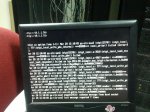tbaror
Contributor
- Joined
- Mar 20, 2013
- Messages
- 105
Hello All,
We currently have 3node MS 2k8r2 cluster that based on FREENAS 8.3 P1, this cluster is used for 3~4 years already without any issue
Since yesterday we having serious issues with the cluster working on-off and some SQL instances want work at all , in the beginning i tought its the iscsi switched and it where replaced
But still we have same issues , i checked all connection and settings nothing seems to be changed , i do see iscsi errors on Freenas console but i really don't have a clue what could cause of this error.
I really need help on it , any advice would be appreciated , i attached screenshot from Freenas console
Please advice
Thanks

We currently have 3node MS 2k8r2 cluster that based on FREENAS 8.3 P1, this cluster is used for 3~4 years already without any issue
Since yesterday we having serious issues with the cluster working on-off and some SQL instances want work at all , in the beginning i tought its the iscsi switched and it where replaced
But still we have same issues , i checked all connection and settings nothing seems to be changed , i do see iscsi errors on Freenas console but i really don't have a clue what could cause of this error.
I really need help on it , any advice would be appreciated , i attached screenshot from Freenas console
Please advice
Thanks



